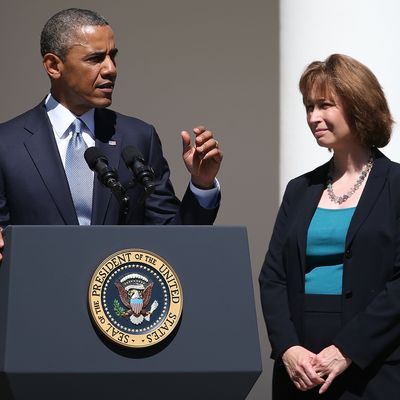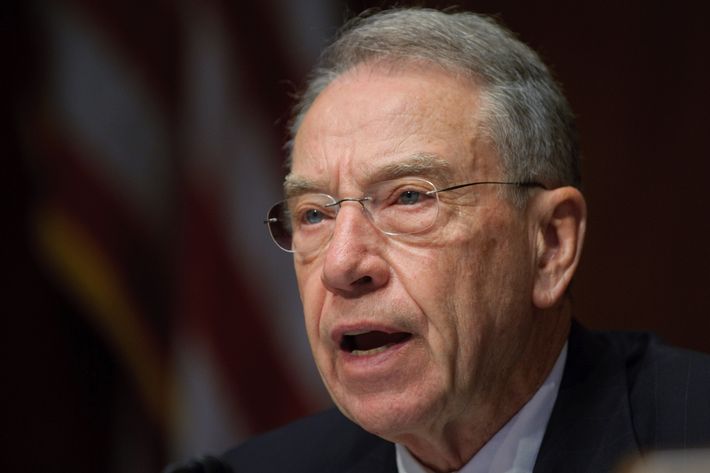
Earlier this month, House Republicans provoked a constitutional showdown with President Obama over the debt ceiling, a confrontation in which Obama prevailed. Now Senate Republicans are provoking a different kind of showdown over judicial appointments. The proximate subject is the D.C. Circuit Court — a kind of mini–Supreme Court with sweeping authority over national policy, and whose composition will help shape the fate of Obama’s second term. But the constitutional question at stake looms larger still. The Senate has submitted another nominee, Patricia Millett, to one of the Court’s vacancies. Republicans are filibustering again. The question is whether Democrats back down, change the rules to stop judicial filibusters, or the parties work out another compromise.
The importance of the struggle can be gleaned through this remarkable quote from Senator Charles Grassley, the ranking Republican on the Senate Judiciary Committee. Grassley is defending a blanket filibuster on any nominee to the three vacancies on the D.C. Circuit. His reasoning is remarkable:
The court is currently comprised of four active judges appointed by Republican presidents and four active judges appointed by Democrat presidents. There is no reason to upset the current makeup of the court, particularly when the reason for doing so appears to be ideologically driven.
The remarkable thing about this passage is not that it’s dishonest, but that every word of it is true. The D.C. Circuit is currently balanced. If Obama appoints judges to fill the three vacancies, Democratic-appointed judges will enjoy a numerical advantage. What’s more, Obama’s motivation for filling those vacancies is ideological. He agrees with the judicial philosophy of left-of-center jurists, not the philosophy of conservative ones.

Of course, every single judicial appointment is intended to alter the ideological balance of that court. Grassley is, therefore, asserting a blanket right to blockade judicial nominees. His principle could be extended to prevent Obama, or any president, from filling any judicial vacancy at all.
It’s easy to lose sight of the breadth of the issue at stake, because the two parties have jostled for decades over just how free a hand the president can wield in seeding the judiciary with allies. Neither party has fully agreed what limits the Senate’s duty to provide “advice” and “consent” to judicial nominees imposes upon the executive branch. The general contours revolve around a basic understanding that the Senate could block scandal-plagued, unqualified, or unusually radical nominees. In 2005, after Senate Republicans threatened to abolish the judicial filibuster, Democrats agreed to filibuster judges only in “extraordinary circumstances.”
After the 2005 agreement, Democrats dropped a filibuster that would have blocked the appointment of Janice Rogers Brown, a radical libertarian jurist who has railed against the New Deal as a “socialist revolution” — which is to say, they defined “extraordinary” in a highly limited way. (Brown, now sitting in the D.C. Circuit, recently ruled on a high-profile birth-control case.) Millett, Obama’s current nominee, has robust professional credentials and deep bipartisan support.
One could argue that Senate Democrats ceded far too much in agreeing to allow the appointment of such extreme jurists, and that the Senate should have more leeway to force presidents to appoint moderates. But it was always understood that the president could appoint someone from his party’s judicial team. Neither party ever contemplated anything resembling the full-scale blockade Senate Republicans are imposing upon the D.C. Circuit.
Senate Republicans have at times offered the rationale that they oppose nominations because they deem the current judges on the court underworked. Democrats dispute that factually, and in any case, it’s laughable on its face. Republicans urgently favored filling every vacancy when their party held the presidency. Even if it were somehow true that the necessary number of judges to handle the court’s work had declined since George W. Bush left office, nobody actually believes that keeping judges busy ought to be the first-order principle of the nominations fight. The first-order principle has always been that presidents get the ability to choose at least somewhat ideologically congenial nominees to federal judgeships.
Earlier this year, in the face of similar (and similarly unusual) blockade tactics against executive branch appointments, Democrats threatened to abolish the filibuster, and Republicans temporarily lifted the blockade.

Why are Republicans renewing the confrontation? One reason seems to be that they feel they have given enough by backing down before: Having agreed to allow a few administration appointments, they feel entitled to renew routine filibusters. “If you’re going to bring up the nuclear threat every time something comes up, people say, ‘Bring it on.’ Go ahead. Go ahead,” blustered Senator Bob Corker.
A second reason is the D.C. circuit’s unique importance. The central policy fight of Obama’s second term will be over the Environmental Protection Agency’s forthcoming climate regulations of existing power plants, a literal battle to save the Earth. Once issued, those regulations will face immediate conservative challenge in the D.C. Circuit, which helps explain the GOP’s desperate fight to prevent Obama from filling those seats.
But the implications of the struggle extend well beyond even this court. The loose architecture of the constitution turns out to leave wide gaps where the relative power of the two branches is undefined. The debt-ceiling showdown was one such gap: Does this power to destroy the world economy grant Congress the right to force the president to accept unrequited concession?
Advice and consent is another such gap. The custom has been to allow the president to nominate at least somewhat friendly judges. But mere custom has taken the place of settled law. There’s no formal rule forcing the opposing party to confirm the president’s appointments for anything. There probably ought to be some mechanism preventing the majority from appointing hacks and wild ideologues, but if no such mechanism can be arranged, the system will default to the parties using their formal power to the maximum extent.
Or consider the implication lying just down the line. We may assume that another Supreme Court vacancy would result in the confirmation of a mainstream judge in the president’s broad ideological mold. But if one of the five Republican-appointed justices were to fall ill or suddenly retire, would Republicans really allow Obama to replace him with another Elena Kagan or Sonia Sotomayor? We believe that the Senate would yield because that’s simply the way things have always been done. But in the Obama era, the way things have always been done has not turned out to be a reliable guide.






























